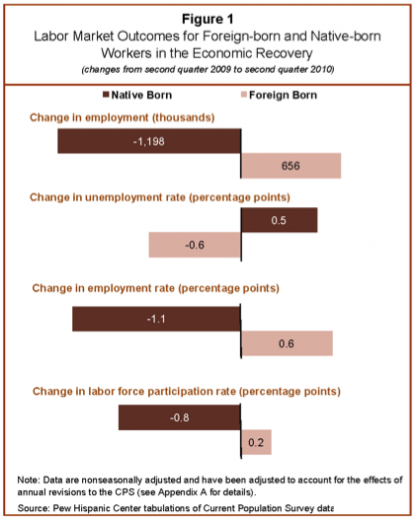Report: Immigrants Gained Jobs After the Recession
Interesting news from the Pew Hispanic Center: Immigrants gained 656,000 jobs in the year after the recession officially ended in June 2009, while native-born
Jul 31, 20202.9K Shares210K Views
Interesting newsfrom the Pew Hispanic Center: Immigrants gained 656,000 jobs in the year after the recession officially ended in June 2009, while native-born workers lost 1.2 million, according to analysis of Census and Department of Labor data.
But the results don’t mean that immigrants were spared from economic harm. The unemployment level among immigrants is still about double its pre-recession rate, and wages fell off considerably among foreign-born workers. This might be because undocumented immigrants cannot receive unemployment benefits, making them more likely to accept low-paying jobs and reduced hours instead of holding out for better positions.
Latinos were hit hardest by the recession, with 4.4-percentage-point drops in employment for both Latinos overall and Latino immigrants. While native-born Latinos continued to lose jobs between June 2009 and June 2010, though, foreign-born Latinos began to gain jobs in construction, health services and sales. Construction was one of the sectors hit hardest by the recession, which led to large joblosses among immigrant men.
Along with unemployment, Latino workers suffered lower median earnings during the recession and the recovery. Median weekly earnings for Latino immigrants fell by 7 percent between 2008 and 2010, from $454 to $422.
Despite the fact that foreign-born workers gained jobs more quickly during the recession, economists say there is no evidenceto support claims that immigrants take jobs away from Americans. Although workers in certain sectors may face job losses due to immigration, overall immigration can actually improveemployment for native-born Americans.
Correction: This post initially stated that native-born workers had lost 1.2 billion jobs since the end of the recession. Thankfully, the economy is not that bad; the number has been corrected to 1.2 million.

Hajra Shannon
Reviewer
Latest Articles
Popular Articles
